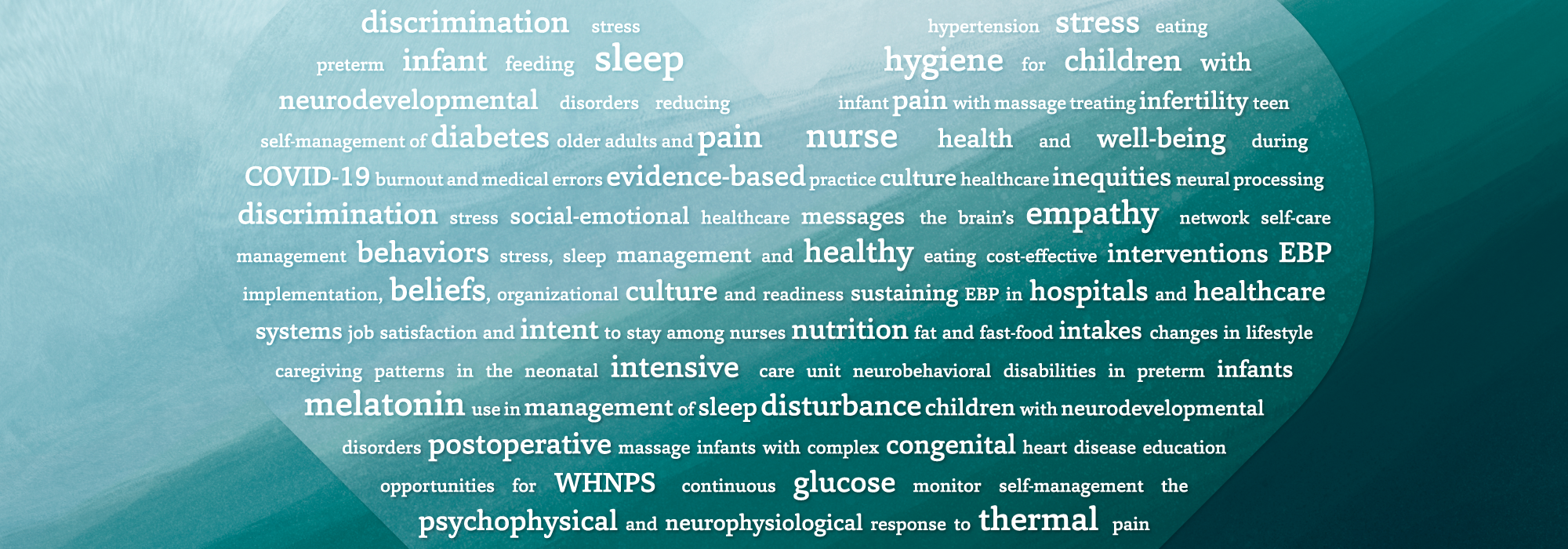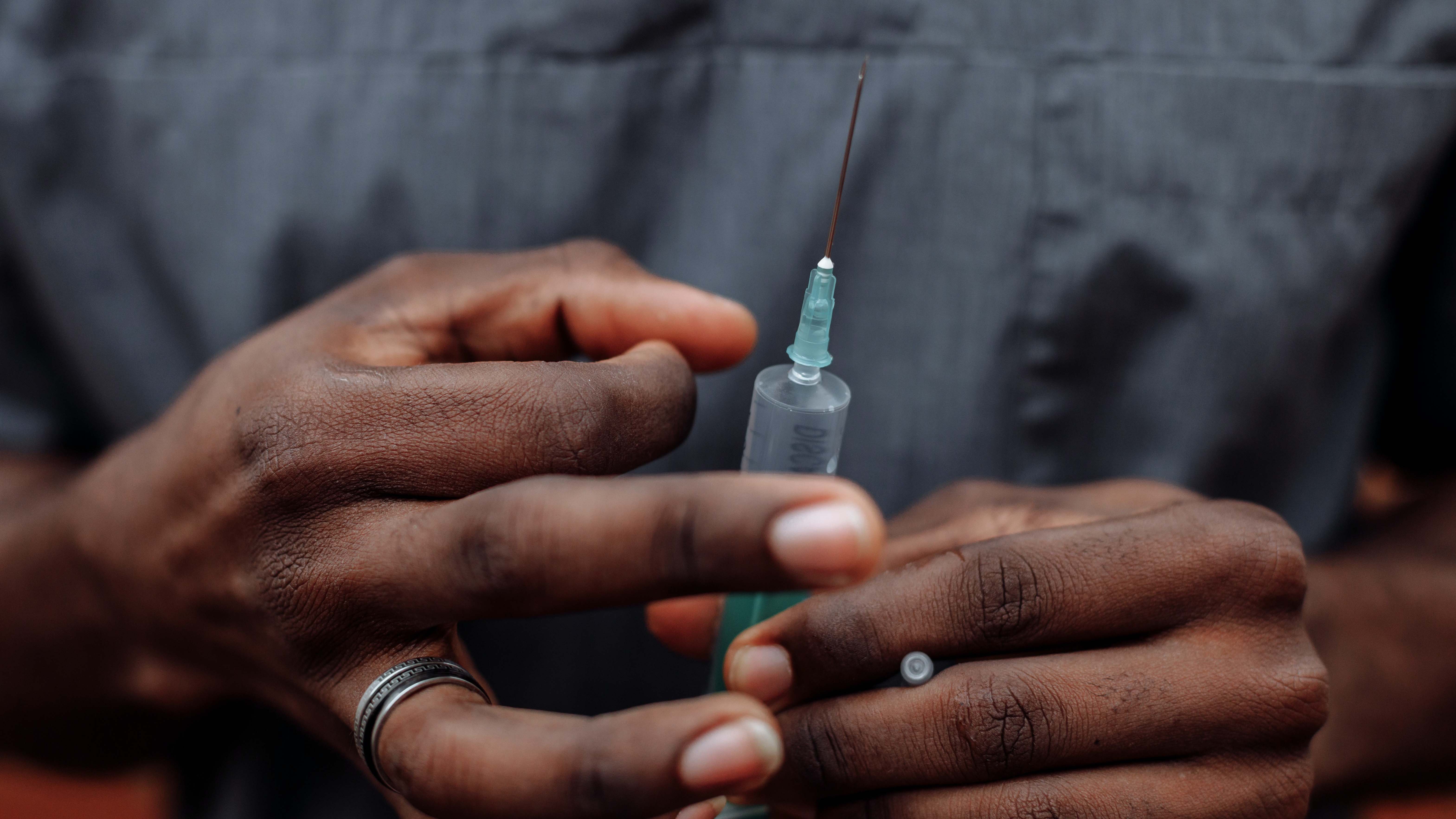
Publications with Passion
This sampling of new publications by our faculty gives a glimpse into what drives us
by Olivia Albert and Susan Neale
Here is a closer look at a few of our recent publications from the 2020/2021 school year that exemplify the kinds of research, quality improvement projects and evidence-based practice initiatives we are passionate about.
Addressing healthcare inequities

Neural processing and perceived discrimination stress in African Americans
Nursing Research. (2020) Wright K.D.,
Jack A.I., Friedman J.P., Jones L.M., Sattar A., Fresco D.M., Moore S.M.
Discrimination stress may reduce a patient’s ability to relate to social-emotional healthcare information appeals that could help them make important behavior changes.
Participants in this secondary-analysis study completed surveys assessing racial discrimination and stress, and their brain activity was monitored by functional magnetic resonance imaging.
The authors found that discrimination stress was significantly related to reduced neural processing of the brain’s empathy network. “Uncovering associations between patient experiences, such as racial discrimination, and their neural processing of health information can lead to the development of tailored health messages and self-care management interventions,” the authors noted.
Explore: The Journal of Science and Healing. (2021) Wright, K.D., Jones, L.M., Adams, I.R., Moss, K.O., Harmon-Still, C., & Nguyen, C.M. Rose, K.M. Klatt, M. (2021).
This study on health education intervention among older African American women with hypertension found that self-care management behaviors can be effective in individuals with hypertension.
The researchers offered group sessions focused on topics such as hypertension knowledge, stress and sleep management and healthy eating. The attendees reported that they intended to continue using the practices.
“Given the dire need for cost-effective interventions to improve the adoption of health promoting self-care management behavior, to reduce the prevalence of hypertension in African Americans, the results of this study have implications for future research and practice,” the authors suggest.
Evidence-based practice (EBP)
Worldviews on Evidence-Based Nursing. (2021) Melnyk, B.M., Tan, A., Hsieh, A.P., & Gallagher-Ford, L.
This study evaluated the structural relationships of the ARCC model, a system-wide framework for implementing and sustaining EBP in hospitals and healthcare systems. The final structural equation model found that EBP culture and mentorship were key variables that positively impacted EBP knowledge, beliefs, competency, implementation, job satisfaction and intent to stay among nurses.
Nutrition

Nutrients. (2020) Chang, M., Brown, R., Wegner, D.T.
Higher stress levels can lead to a trip to the fast-food drive-through. But what happens to stress when changes in lifestyle are implemented? This study found that low-income overweight or obese mothers reported a significant decrease for fast-food intake after a lifestyle intervention. The stress intervention they implemented had effects on both fat and fast-food intakes. The authors of the study suggest that “future dietary intervention studies aimed to reduce fat and fast-food intakes in low-income overweight or obese mothers of young children might consider including practical strategies aimed at reducing perceived stress.”
Maternal/neonatal health
Effect of tactile experience during preterm infant feeding on clinical outcomes
Nursing Research. (2020) Pickler, R.H., Meinzen-Derr,
J., Moore, M., Sealschott, S., & Tepe, K.
The researchers found that providing touch while tube feeding babies born too early for oral feeding can help them learn to feed orally sooner. Noting that inconsistent caregiving patterns in the neonatal intensive care unit are a contributor to higher rates of neurobehavioral disabilities in preterm infants, Pickler and her team investigated whether physical touch could help preterm babies learn to feed more quickly. They found that “infants receiving touch at more than 25% of early gavage (tube) feedings achieved full oral feeding more quickly; as touch exposure increased, time from first to full oral feeding decreased.” This simple intervention could improve outcomes for preterm babies and lead to earlier hospital discharge.
Pediatrics
Journal of Pediatric Healthcare. (2021) Hosley, S., Fortney, C., Harrison, T., & Steward, D.
The purpose of this quality improvement project was to improve healthcare provider consistency in addressing and documenting the use of sleep hygiene (habits used to get a good night’s sleep) in children with neurodevelopmental disorders in alignment with evidence-based strategies.
Findings indicated a 42% increase in documentation of sleep hygiene and a 55% increase when introducing melatonin. The authors suggested that “the increase in documentation supports success of this initial practice change and demonstrates adherence to evidence-based sleep hygiene strategies.”
Effects of massage on post-operative pain in infants with complex congenital heart disease
Nursing Research. (2020) Harrison T. M., Brown R., Duffey T., Frey C., Bailey J., Nist M., Renner L., Fitch J.
This study found that postoperative massage may reduce pain and improve physiological parameters for infants with complex congenital heart disease. Infants were given daily massages and demonstrated lower daily pain scores and immediate decreases in heart and respiration rates compared to infants given the traditional “rest” period.
Sexual health
Initial evaluation of the male with infertility
Women’s Healthcare: A Clinical Journal for NPs. (2020) Masciola, R.L. and Waryold, J.
A couple wondering why they haven’t conceived yet might ask the female partner’s women’s health nurse practitioner (WHNP) to evaluate the male partner as well. Is the WHNP qualified to evaluate male infertility, too? Yes. Masciola advocates for more education opportunities for WHNPS to build skills and update knowledge in this evidence-based article. The article details a clinical case study of a male patient’s visit to a WHNP in primary care, including diagnostic testing, treatment suggestions and education for male infertility.
Nurse health and well-being
Nursing Administration Quarterly. (2021) Melnyk, B.M., Hsieh, A.P., Tan, A., Teall, A.M., Weberg, D., Jun, J., Gawlik, K., Hoying, J.
A new study from the College of Nursing quantifies how the COVID-19 pandemic, coupled with variable workplace wellness cultures and long shifts caring for patients, has severely impacted nurses working on the front lines.
The team surveyed 264 nurses associated with Trusted Health, which places travel nurses at hospitals and healthcare systems across the country, between August and October 2020. Among the key findings, 53.8% reported that the pandemic worsened their physical health and 79.2% reported that it worsened their mental health. Nurses reported depressive symptoms, anxiety and stress, and 65.5% reported feelings of burnout.
Critical care nurses’ physical and mental health, worksite wellness support, and medical errors
American Journal of Critical Care. (2021) Melnyk, B.M., Tan, A., Hsieh, A.P., Gawlik, K., Arslanian-Engoren, C., Braun, L.T., Dunbar, S., Dunbar-Jacob, J., Lewis, L., Millan, A., Orsolini, L., Robbins, L.B., Russell, C.L., Tucker, S., Wilbur, J.
Critical care nurses experience higher rates of mental distress and poor health than other nurses, adversely affecting healthcare quality and safety. It is not known, however, how critical care nurses’ overall health affects the occurrence of medical errors. This study examined associations among critical care nurses’ physical and mental health, perception of workplace wellness support and self-reported medical errors.
A total of 771 members of the American Association of Critical-Care Nurses participated. Nurses in poor physical and mental health reported significantly more medical errors than nurses in better health. Nurses who perceived that their worksite was very supportive of their well-being were twice as likely to have better physical health.
Diabetes

Self-management among pre-teen and adolescent diabetes device users
Pediatric Diabetes. (2020) Faulds, E.R., Hoffman R.P., Grey M., Tan A., Tubbs Cooley, H., Militello, L.K., Happ, M.B.
Despite increased diabetes device use, few young people with type 1 diabetes meet glycemic targets. The authors studied the associations between insulin pump and continuous glucose monitor (CGM) self-management and glycemic control in a cohort of 10- to 18-year-olds. Self-management behaviors such as frequency of insulin dosing, frequency of glucose values entered into pump, and use of CGM among pre-teen and adolescent diabetes device users were found to be significantly associated with both HbA1c, a three-month laboratory measure of glycemic control; and daily time in range, the percentage of time that glucose levels stay stable.
Pain
Journal of Advanced Nursing. (2021) Atalla, S. W., Cowan, R. L., Anderson, A. R., Dietrich, M. S., Iversen, L., Kalvas. L. B., Moss, K. O., Wright, K. D. & Monroe, T. B.
The authors of this study tested psychophysics and blood oxygenation levels to see if they could show the biological reasons for differences in pain in older adults. This preliminary study is part of a larger initiative aiming to determine sex- and age-associated psychophysical and neurophysical differences in the processing of pain across the adult lifespan.
“Exploring the biological reasons for age- and sex-associated differences in pain processing will increase our understanding of pain in older adults,” the authors commented. “The paucity of neurobiological evidence to support best practice pain management in older adults places these individuals at risk for poor pain management."
In this issue
- Diane Von Ah: Solving Cancer Care Puzzles
- Faye Wattleton: Committed to Women's Health
- Amanda Parker: Finding the Light Within
- Publications with Passion
- New Grants Roundup
- Building Update
- Advancing EBP: Clinicians Dare to Dream
- Bridge Care: Denise Williams
- Student Mental Health Initiatives
- Student Life: Back to Campus
- Health Equity Scholars
- Young Alumni Blog
- Homecoming
- Connie Gallaher: Paying it Forward
- Virtual Trails
